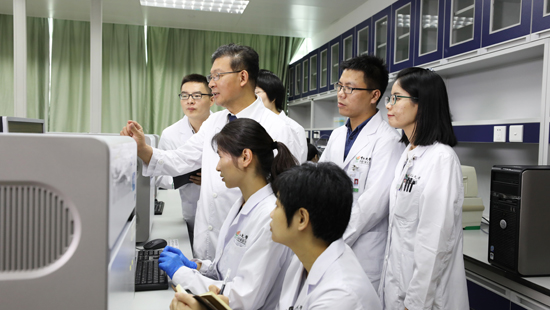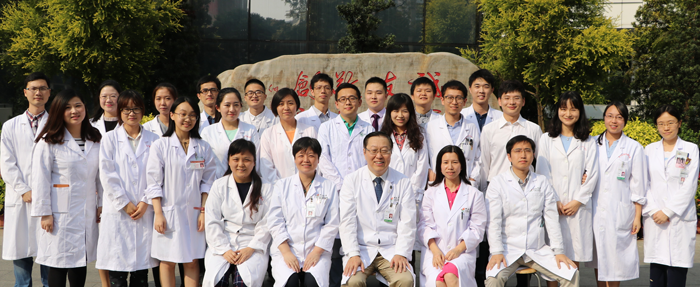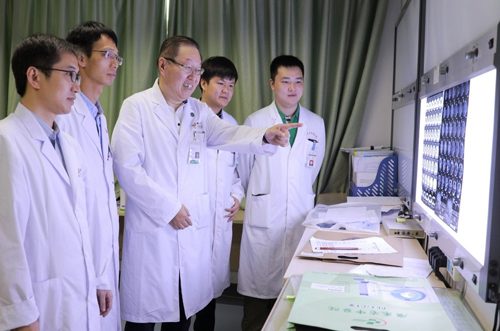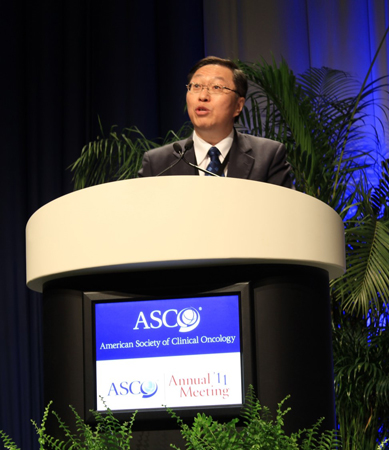The Department of Medical Oncology was established in 1964. It is one of the earliest departments specializing in cancer chemotherapy in China. There are five department divisions: gastrointestinal cancer division, thoracic oncology division, breast cancer division, lymphoma division and a stem cell transplant section. It is now a recognized as a leading unit in the field of domestic cancer care in South China.
Cancer Care
The department provides individualized and comprehensive treatment for various tumors including:
Lymphoma (including non-Hodgkin lymphoma and Hodgkin lymphoma): Chemotherapy targeted therapy, Chimeric Antigen Receptor T-Cell Immunotherapy (CAR-T), and immunotherapy; High-Dose chemotherapy with autologous stem cell rescue
Gastrointestinal cancer: (including esophageal cancer, gastric cancer, colon cancer, rectal cancer, hepatocellular carcinoma, cholangiocarcinoma and pancreatic cancer) adjuvant chemotherapy, palliative chemotherapy, targeted therapy and immunotherapy.
Lung cancer: Chemotherapy and targeted therapy
Breast cancer: Endocrine therapy, chemotherapy and targeted therapy
Nasopharyngeal carcinoma: Chemotherapy
Head and neck cancers (including tongue cancer, laryngeal carcinoma and parotid carcinoma, etc.): Chemotherapy
Testicular tumors and bladder cancer: Adjuvant chemotherapy and palliative chemotherapy
Prostate cancer: Hormone therapy and chemotherapy
Sarcoma: (including osteosarcoma, malignant fibrous histiocytoma of bone, Ewing sarcoma family of tumors and soft tissue sarcoma etc.) Chemotherapy
Gastrointestinal Cancer Division

Gastrointestinal (GI) cancer is a major health-threatening issue in China with an incidence and mortality accounting for more than 50% of all malignancies. The GI medical oncology team led by Professor Rui-Hua Xu have been conducting a series of clinical new drug research and investigator-initiated clinical trials on multiple cancers including esophageal cancer, gastric cancer, and colorectal cancer. They focus on improving the early cancer diagnosis rate, developing individualized therapeutic strategies and exploring mechanisms underlying tumor metastasis and drug resistance. Their findings have remarkably contributed to the development of GI cancers from early diagnosis to novel treatment. The early diagnostic accuracy of hepatocellular carcinoma (HCC) has greatly improved due to the GI team’s work with the identification of a ctDNA methylation marker panel fingerprint. As well as, their independently developed AI assisted endoscopy system which has an accuracy of 96% in the diagnosis of upper GI cancers, significantly helping the early screening of GI cancers. The GI team has also optimized targeted therapy for advanced HER2-positive gastric cancer. They determined the optimal dose of anti-HER2 drugs and developed a real-time, non-invasive method to monitor drug resistance for the first time. They also discovered UGT1A1 guided modified XELIRI for CRC had comparable efficacy with FOLFIRI in the second line of CRC treatment, but with lower toxicities. Meanwhile, more and more immunotherapy clinical trials are being carried out by the GI team. Through these trials, the efficacy and safety of toripalimab was determined in advanced gastric cancer patients. Biomarkers such as TMB and POLE/POLD1 were also determined as biomarkers for PD-(L)1 inhibitors in GI cancers.

Up till now, the GI team has published more than 300 SCI papers with more than 3,000 citations. Their studies were cited by 8 international guidelines and 84 classic English monographs; benefiting millions of cancer patients and contributing Chinese wisdom to global oncology development.
The GI team also won second prize at the National Science and Technology Awards (2017, 2019), first prize at the Guangdong Science and Technology Awards (2016, 2018), the Outstanding Science and Technology Achievement Award of the Ministry of Education (2016, 2018) and the Chinese Medical Science and Technology Award (2016, 2018).
 Specialists
Specialists
Rui-Hua Xu, M.D., Ph. D, Professor and President of Sun Yat-sen University Cancer Center, Director of State Key Laboratory
Yu-Hong Li, M.D., Ph. D, Professor & PhD supervisor
Feng-Hua Wang, M.D., Ph. D, Professor & PhD supervisor
Dong-Sheng Zhang, M.D., Ph. D, Professor & PhD supervisor
Feng Wang, M.D., Ph. D, Professor, Vice Director, PhD Supervisor
Hui-Yan Luo, M.D., Ph. D, Associate Professor & Master Supervisor
Zhi-Qiang Wang, M.D., Ph. D, Associate Professor & Master Supervisor
Miao-Zhen Qiu, M.D., Ph. D, Associate Professor & Master Supervisor
De-Shen Wang, M.D., Ph. D, Associate Professor & Master Supervisor
Dong-Liang Chen, M.D., Ph. D, Associate Professor & Master Supervisor
Thoracic Oncology Division

Targeted therapy and immunotherapy have brought remarkable clinical benefits for patients with advanced lung cancer, however, the heterogeneity of this malignancy impedes further improvements in survival. The Division of Thoracic Oncology is made up of highly-specialized medical oncologists with comprehensive expertise in the treatment of lung cancer. Our lung cancer team, led by Professor Li Zhang, is working on subdividing lung cancers into smaller groups of diseases to provide the best individualized treatment plan for each patient based on the genetic background and biological behavior of their tumors. We are also dedicated to developing novel agents and new treatment strategies for advanced lung cancer. Patients who attend our division have the chance to participate in clinical trials and use some of the most cutting-edge therapies. We have helped several new agents gaining the NMPA (National Medical Products Administration) approval in treating lung cancer. These treatments have provided sustained benefits for patients with advanced lung cancers who would otherwise be treated by conventional therapies.


Specialists
Li Zhang, Chief of Medical Oncology, Professor
Likun Chen, Professor
Yan Huang, Professor
Ningning Zhou, Associate Professor
Yuanyuan Zhao, Associate Professor
Wenfeng Fang, Associate Professor
Xue Hou, Associate Professor
Ying Liang, Associate Professor
Yunpeng Yang, Associate Professor
Junling Liu, Associate Professor
Shaodong Hong, Associate Professor
Ting Zhou, Attending Physician
Yaxiong Zhang, Attending Physician
Breast Cancer Division
Breast cancer is the most common malignant tumor in women and its incidence is increasing every year. According to different stages and different types of breast cancer, the group provides individualized and comprehensive treatment, including treatments such as endocrine therapy, chemotherapy, targeted therapy and immune therapy.
There are 39 professionals in the department of the breast cancer treatment group, including 3 professors and 7 associate professors. Treatment is available through multidisciplinary teams including surgeons, radiologists, and chemotherapy physicians. They work together to make optimal therapeutic plans for each patient based on the principle of individualization.
In 2019, the group treated approximately 20,000 outpatients and 8,000 inpatients. As such, the department has rich experience not only in treatment but in clinical research for anticancer drugs. The group has made significant contributions to the development of novel anticancer drugs, such as antibody-drug conjugate, immunotherapy, and chemotherapy.
The group has also developed many professionals in breast cancer medical therapy. Each year the division recruits approximately five university graduates including candidates for masters and Ph.D. degrees in Clinical Oncology, and attracts more than 10 medical doctors from all over the country for professional training. Up to now, more than 20 research projects have been supported by the National Natural Science Fund, the provincial and municipal science and technology plans, and the Provincial Bureau of Public Health Fund, totaling over 20 million RMB.
The group also participates in many international and nationwide multi-center studies involving neo-adjuvant, adjuvant chemotherapy, and palliative treatment. At present, there are 30 clinical trials ongoing. The group also conducts a number of investigator-initiated clinical studies. The SYSUCC-001 study was submitted as an oral presentation at ASCO 2020.
A large number of breast cancer patients are prone to familial diseases. In 2017, our department of Breast Medicine took the lead in establishing a breast cancer genetic consultation clinic in China. Our group also provides treatment for testicular tumors and bladder cancers.
Specialists
Currently, there are 10 senior specialists in the department, including 3 PhD supervisors and 7 Master supervisors.
Shusen Wang, M.D., Ph. D,Professor and PhD supervisor, Department of Medical Oncology, Chief expert of Breast Cancer Medical Treatment Group
Zhongyu Yuan, M.D., Ph. D, Professor and PhD supervisor, Department of Medical Oncology
Yanxia Shi, M.D., Ph. D, Professor and PhD supervisor, Department of Medical Oncology
Fei Xu, M.D., Ph. D, Associate Professor and Master Supervisor, Department of Medical Oncology
Jiajia Huang, M.D., Ph. D, Associate Professor and Master Supervisor, Department of Medical Oncology
Xin An, M.D., Ph. D, Associate Professor and Master Supervisor, Department of Medical Oncology
Xiwen Bi, M.D., Ph. D, Associate Professor and Master Supervisor, Department of Medical Oncology
Wen Xia, M.D., Ph. D, Associate Professor and Master Supervisor, Department of Medical Oncology
Cong Xue, M.D., Ph. D, Associate Professor and Master Supervisor, Department of Medical Oncology
Ruoxi Hong, M.D., Ph. D, Associate Professor and Master Supervisor, Department of Medical Oncology
Kuikui Jiang, M.D., Ph. D, Attending Doctor, Department of Medical Oncology
Lymphoma Division
The Division of Lymphoma in Sun Yat-sen University Cancer Center’s Department of Medical Oncology is made up of well-trained and highly-specialized medical oncologists with comprehensive expertise in lymphoma. Our team is working on providing the best individualized treatment (including chemotherapy, targeted therapy, immunotherapy, high-dose chemotherapy with autologous stem cell rescue, chimeric antigen receptor T-cell immunotherapy, and clinical trials) for each patient. We have carried out a large number of clinical trials and have promoted to develop novel agents and new treatment strategies for lymphomas. Our published papers have been cited by the Chinese expert consensus and the NCCN guidelines. We have contributed to improve the identification of high-risk gene mutations, clinical prognostic stratification and staging, treatment strategies, and clinical outcomes for patients with NK/T-cell lymphoma. We have promoted the treatment improvement in lymphoma patients with hepatitis B infection and EBV infection.
Specialists
Huiqiang Huang, Vice Chief of Medical Oncology, Professor
Qingqing Cai, Vice Chief of Medical Oncology, Professor
Zhiming Li, Professor
He Huang, Associate Professor
Yi Xia, Associate Professor
Panpan Liu, Associate Professor
Xiaoxiao Wang, Associate Professor
Xuanye Zhang, Associate Professor
Zhao Wang, Attending Physician
Peng Sun, Attending Physician
Yu Wang, Attending Physician
Bing Bai, Attending Physician
Yan Gao, Attending Physician
Xiaojie Fang, Attending Physician
Hang Yang, Attending Physician
Updated July 2020
Copyright:Sun Yat-sen University Cancer Center Designed by Wanhu.